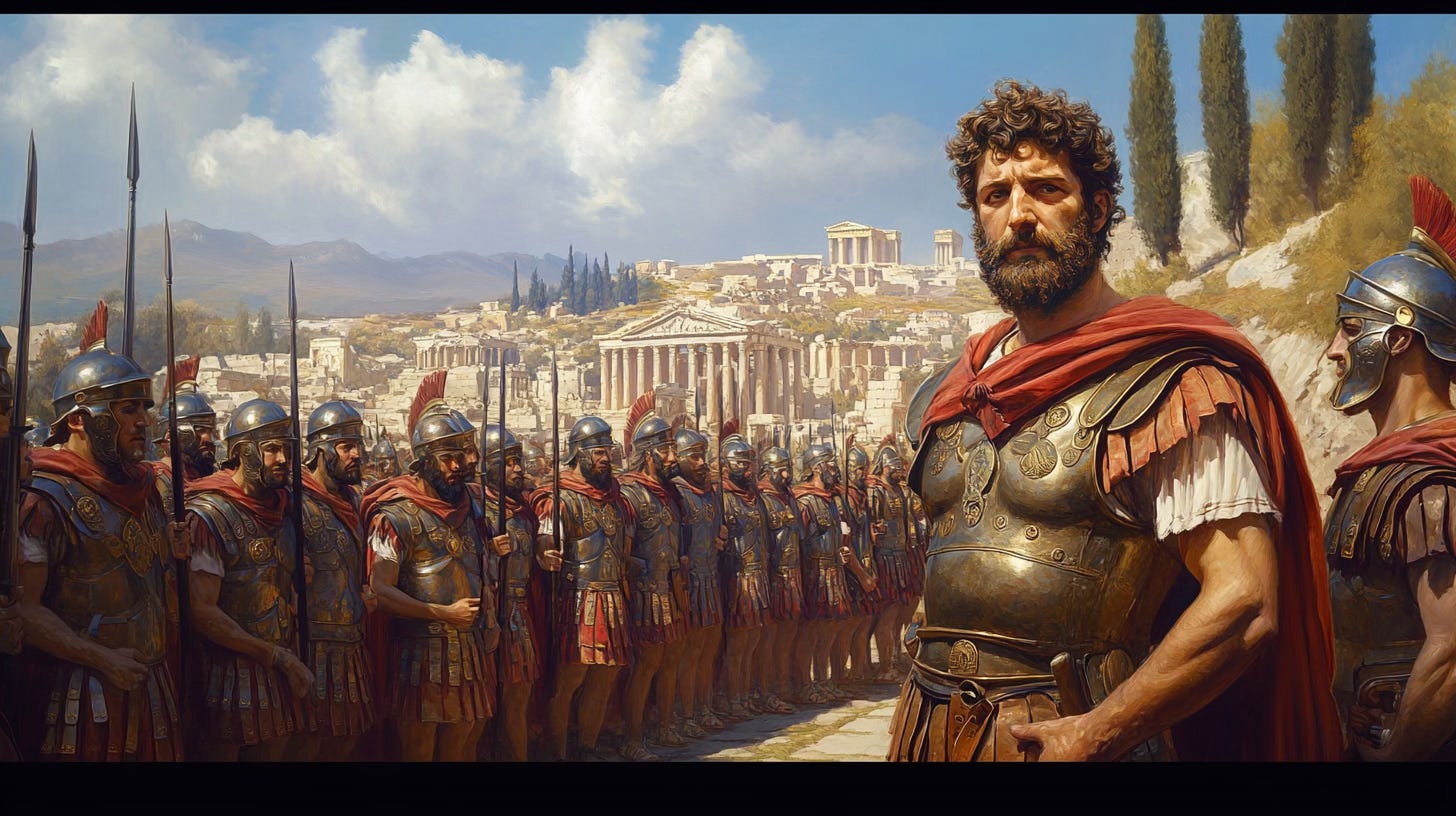Imagine the raised eyebrows in Rome's philosophical circles when Marcus Aurelius—that most celebrated of Stoic emperors—decided to endow a chair of Epicurean philosophy in Athens. Here was a man whose personal writings overflow with Stoic wisdom, who studied at the feet of the era's greatest Stoic teachers, and who spent his nights penning meditations on duty, virtue, and the rejection of pleasure. Yet in 176 CE, he made sure the Epicureans got their seat at Athens' philosophical table, alongside their longtime intellectual rivals.
The story of how these rival schools ended up in this position is a tale of empires, ideas, and ironies spanning nearly five centuries. Back in Athens of the 4th century BCE, two revolutionary philosophical movements emerged within a generation of each other. Epicurus established his famous Garden in 307 BCE, creating a community where men and women could pursue happiness through rational pleasure and tranquility. Just a few years earlier, Zeno had begun teaching in the Stoa Poikile, the painted porch that would give Stoicism its name.
These schools were children of chaos, born in the aftermath of Alexander's empire-shattering campaigns. Both promised paths to happiness in an uncertain world, but they couldn't have disagreed more about how to get there. While Epicurus taught that pleasure—properly understood—was life's greatest good, the Stoics insisted that virtue alone was sufficient for happiness. It was a debate that would echo through centuries.
As Rome rose from regional power to Mediterranean hegemon, these Greek philosophical movements made their way west. But they didn't travel equally well. Stoicism, with its emphasis on duty, public service, and endurance, seemed almost custom-made for the Roman temperament. By the late Republic, it was becoming the unofficial philosophy of Rome's ruling class. Epicureanism, meanwhile, found its adherents among poets, intellectuals, and those somewhat removed from the corridors of power—though it never lacked for influential supporters.
The philosophy's emphasis on pleasure—however refined and carefully defined—made it an easy target in a society that prided itself on duty, sacrifice, and stern-faced virtue.
Roman critics had spent generations painting Epicureans as everything from soft-minded Greeks to outright subversives. Cicero, despite his occasional fair-mindedness toward Epicurean ideas, couldn't resist portraying them as philosophical lightweights. And yet, Epicureanism persisted. Its appeal to rational pleasure and its promise of peace in a turbulent world kept attracting followers, even as official Rome wrinkled its nose at its teachings.
Enter Marcus Aurelius, a man who, by all rights, should have been Epicureanism's natural enemy. His "Meditations" read like a greatest hits compilation of Stoic thought—all about accepting fate, finding strength in adversity, and viewing pleasure with suspicion. But Marcus, despite his personal philosophical commitments, seems to have understood something his predecessors missed: a thriving intellectual culture needs diversity of thought, not philosophical monopoly.
The emperor's endowment in Athens wasn't just about funding philosophical education. It was a statement about intellectual freedom in the Roman world. By establishing chairs for all major schools—Stoic, Platonic, Peripatetic, and yes, Epicurean—Marcus acknowledged that the pursuit of wisdom doesn't follow a single path. This from a man who wrote that the universe is reason, that pleasure is beneath the wise, and that duty is all.
What makes this move even more remarkable is its timing. By 176 CE, Marcus had seen enough trouble to justify a more restrictive approach. He'd dealt with rebellions, plagues, and wars. Traditional Roman values probably seemed more important than ever. Yet here he was, ensuring that students in Athens could still learn about Epicurus's atoms, his arguments for limiting desires, and his unconventional views on the gods.
The decision proved more consequential than Marcus might have imagined. His endowment helped preserve Epicurean thought through centuries when it might otherwise have disappeared. Those funded positions in Athens became lifelines for philosophical traditions that swam against the cultural current. The emperor who spent his life practicing Stoic detachment ended up becoming, however unintentionally, one of Epicureanism's most important protectors.
Perhaps there's a lesson here about the difference between personal conviction and public wisdom. Marcus Aurelius never wavered from his Stoic principles, but he seems to have understood that philosophical truth—like imperial power—is best served with a light touch. In protecting a philosophy that challenged his own beliefs, he displayed a kind of wisdom that transcended both Stoic and Epicurean teachings.
Now that's something worth meditating on.
Peace and Safety,
Ειρήνη και Ασφάλεια





